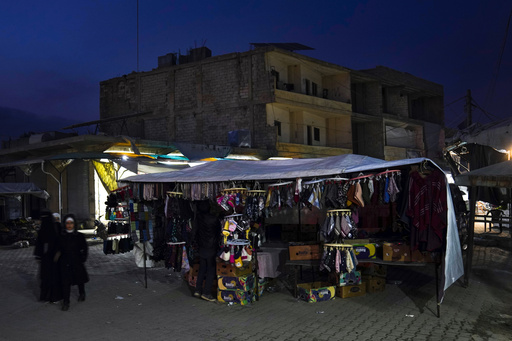
DAMASCUS, Syria — The atmosphere in churches throughout Syria’s beleaguered Christian community was charged with emotion as they observed their first Sunday services following the downfall of Bashar Assad’s regime. Some congregants were moved to tears, while others gathered in heartfelt prayer. “They assure us that a new government will be established soon, and with God’s grace, conditions will improve because we have ousted the tyrant,” stated worshiper Jihad Raffoul, expressing a shared hope for a more inclusive future.
Suzan Barakat, another attendee, echoed this sentiment, stating, “Our prayers today are for a new chapter in Syria’s story.” To assist in the transition, U.N. envoy for Syria, Geir Pedersen, called for an expedited end to Western sanctions as the coalition that removed Assad and forced him into exile in Russia considers its next steps. The United States, European Union, and others have had extensive sanctions in place against Syria due to Assad’s harsh reaction to peaceful protests that began in 2011, which later spiraled into a full-blown civil conflict.
Demonstrating a desire for normalcy, schools in Damascus reopened their doors for the first time since Assad’s exit. At the Nahla Zaidan school located in the Mezzah area, teachers raised the three-star revolutionary flag in a display of hope. “With God’s help, there will be progress in development, security, and construction in our beloved nation,” said Maysoun Al-Ali, the school’s director.
Nevertheless, the road to rebuilding is fraught with challenges. The new leadership has yet to articulate a clear governance strategy, and the main faction behind the offensive remains designated a terrorist group by the U.S. However, the Biden administration has reportedly begun direct communications with this group. Officials in Washington have hinted at the possibility of removing the terrorist designation from Hayat Tahrir al-Sham (HTS), a faction that was once connected to al-Qaida.
The interim government is expected to be in place until March. Arab foreign ministers have advocated for elections to be conducted under U.N. supervision based on a newly revised constitution. “We must commence a political process that is inclusive of all Syrian voices,” stated Pedersen, while also emphasizing the need for accountability regarding the atrocities committed throughout the war. Many families continue to seek information about the thousands who have been imprisoned or detained by Assad’s regime.
During an urgent meeting with foreign ministers from the U.S., Arab League, and Turkey, along with high-ranking officials from the European Union and U.N., there was unified agreement that the new Syrian government must work to prevent extremist groups, including remnants of the Islamic State, from resurgent activity while ensuring the defusing and elimination of any remaining chemical weapons from Assad’s era. The participants also called for an immediate halt to all fighting in the region.
Regarding regional tensions, Israeli Prime Minister Benjamin Netanyahu declared in a video statement that “we have no interest in conflict with Syria.” He noted that Israeli military operations over the past week, including numerous airstrikes, were to counter emerging threats. Israel has also deployed ground troops, characterizing the maneuvers as temporary but suggesting an indefinite presence.
HTS leader Ahmad al-Sharaa expressed that their faction has no intention of engaging in any conflict due to the prevailing exhaustion felt across Syria. Concurrently, Netanyahu’s administration advanced initiatives aimed at encouraging population growth in the Golan Heights. Qatar quickly condemned this move, labeling it “a new chapter in a series of Israeli aggressions against Syrian territory and a vigorous breach of international law.” Even though Israel annexed the Golan Heights following the 1967 war, a majority of the international community still sees it as occupied territory, with only the U.S. recognizing it as part of Israel.
In examining the implications of this new leadership in Syria, there have been calls for increased respect for minority and female rights. Prior to the civil war, Syrian Christians comprised about 10% of the national population, but many fled or supported Assad due to concerns over Islamist militant groups. Last week’s church services were canceled due to fears. “We were terrified of the unfolding events,” mentioned Ibrahim Shahin, a Catholic church supervisor. However, this week, churches were reopened, and bells rang out across the city.
“Now we observe a greater level of respect towards minorities; they seem to genuinely care for us,” shared Agop Bardakijian, a Christian resident of Aleppo, while enjoying time at a lively café. Children were seen taking photos in front of Christmas decorations. Residents had been forewarned of potential violence as rebels approached, but nothing of that sort transpired, according to a local named Raed, who expressed, “The revolution should have happened long ago.”
Despite the overall signs of hope, some instances of chaos emerged, such as a rebel unit being deployed to prevent looting in a residential complex for former military personnel in southeastern Damascus, where crowds attempted to ignite apartments. The rebels responded by firing warning shots and detaining several looters. Incidents of looting in the capital have remained relatively contained, however.
